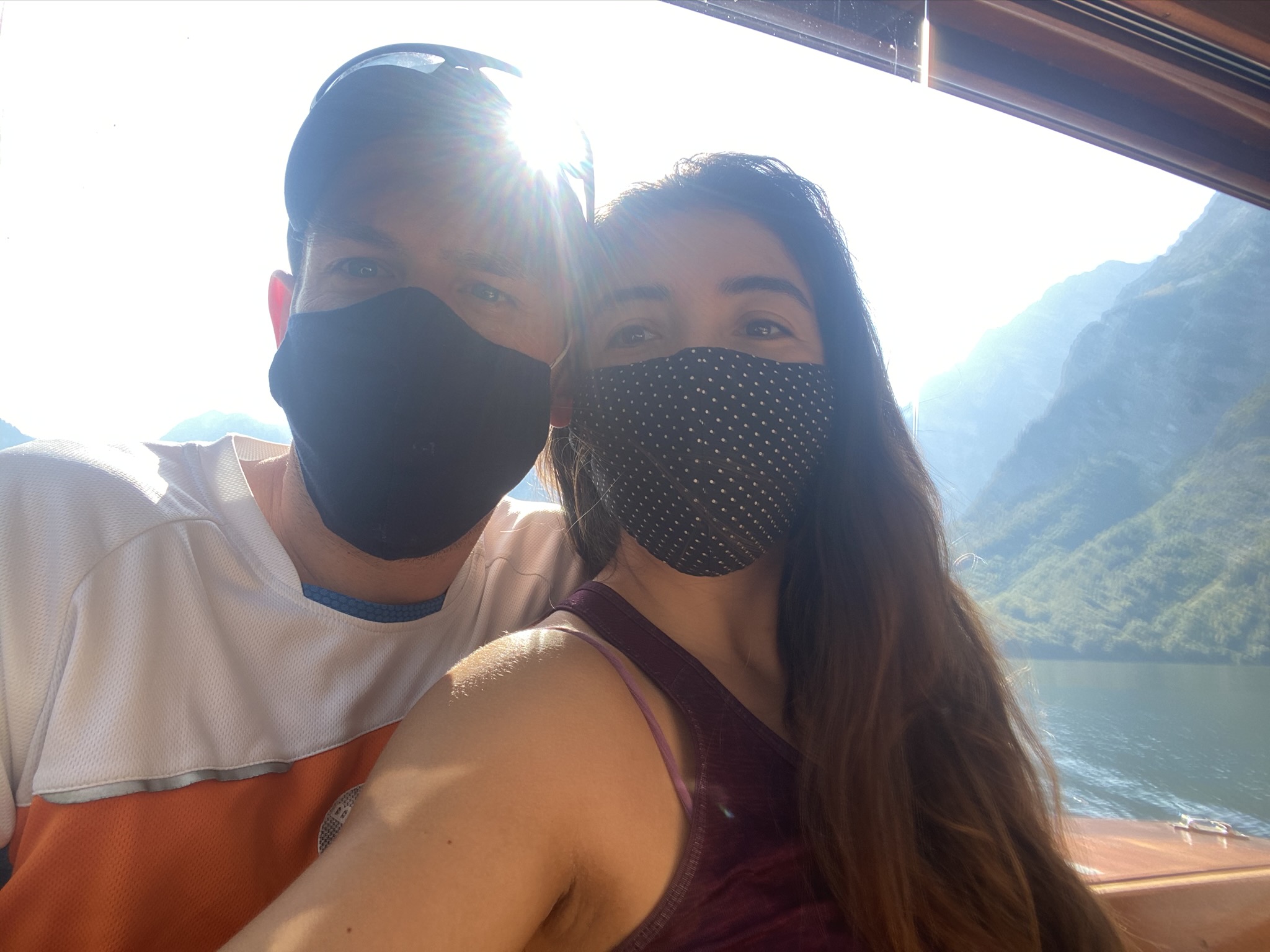Travelling safely during a pandemic
Tips and stories from our travels during the coronavirus pandemicThe year 2020 took all of us by surprise with an unprecedented pandemic that caused lockdowns around the globe, disrupted massively air traffic, and forced us to cancel most of our social events and travel plans. Without underestimating the huge health, social, economic and psychological impacts of the coronavirus pandemic, and recognizing our privileged and lucky position by not having to suffer (yet) from some of the worst impacts of this pandemic, we would like to focus this article on a rather mundane affair which has raised a lot of attention among our followers and friends: how to travel safely in the “new normality” of a global pandemic.
Yes, we both had to cancel our birthday parties this year, and also had to spend hours on the phone talking with airlines, event organizers, hotels, insurance companies, etc. to clarify issues about cancelations, rescheduling, and reimbursement. However, we must recognize that despite the unusual circumstances we have managed to have really nice holidays and travel to exciting destinations in 2020, all while taking care of ourselves and our loved ones and not being infected with the coronavirus. Here we give you some tips of what we have done for travelling during this “new normality”, which might be helpful if you are planning to travel in the next months (or possibly years), and share with you some stories about the most difficult or strage times we lives, which looking backwardy can be a bit funny and hopefully make you smile.
Travel tips
1. Plan flexibly and adaptatively
While it is always advisable to plan in advance a route, accommodation and activities for your trip, in particular to make sure that everything is covid-compliant, under the current circumstances EVERYTHING can change even at the last minute and you will need to be prepared to react quickly and be flexible with your plans. Concrete measures in this direction which we have followed are: always book tickets and accomodation with possibility for (at least partial) reimbursement, inform yourself constantly both in the official and unofficial (e.g. social media) communication channels of the authorities of your destination about travel requirements and restrictions, always think of a B and a C plan in case things change unexpectedly (e.g. flight cancellation, getting infected with covid), and buy a good travel and medical insurances that can save you from financial bankruptcy in the worst case scenario.
2. Be responsible and follow the precautionary principle
We are all free adults and can make our own decisions about where to go and who to meet with, however a global pandemic is an unprecedented situation and not following the health authorities advice can put you or your friends and family in risk. Being cautious might ruin some of your plans, separate you from your loved ones, and cost you some additional money, but it is the only thing we can recommend. Concrete measures in this direction which we have followed are: take a corona test even if you don’t have any symptoms before visiting your family or any friends with whom you will share longer periods of time or have close physical contact, isolate yourself immediately after any possible contact with a positive case or risky situation (e.g. long flight) and after the possible incubation time make a test, monitor your possible symptoms (e.g. temperature) regularly when travelling, don’t be afraid to cancel meetings or reject invitations if you have the feeling you will meet is not very careful with the social distancing rules.
3. Don’t get frustrated
Travelling during a pandemic is your own choice and is associated with many risks of different nature so getting frustrated and upset about sudden changes in your plans, or about losing some money or spending more than under normal times won’t help at all. The most important part about a holiday is relaxing and enjoying, so in case of a change of plans think that even behind the most upsetting situation, there is always the chance to turn things around (we will tell you some of stories that prove this below), and in the end as long as your loved ones are healthy and safe, there is nothing serious to worry and frustrate about.
4. Make the best out of a crisis:
2020 was a terrible year for the tourism industry globally, and the long-term implications in this industry are still unknown. However, for the time being, many companies in the industry (from hotels and airbnbs to private tourist guides) are trying to survive this though year by offering very good prices, if you look for in the right place and time (last minute reservations even) and compare a couple of options using different internet portals you will get very low prices compared to other years. We have used this to our advantage to stay in nicer hotels that we would have chosen normally, enjoy private guided tours at affordable prices, get really nice souvenirs for our family (including a painting painted by the artist with all the elements we wanted on it), and even spending a weekend in a nice hotel in our own city when we needed a change of scenery.
Some funny (and not so funny) stories
In this blog, we share some of the best moments and memories from our travels, but everyone who has travelled around the world, especially in the middle of a pandemic, knows that not everything is fun and relaxing. Here we wanted to share with you some stories about the most difficult or strange times we lived, which looking backwards can be a bit funny and hopefully make you smile and learn something so that this doesn’t happen to you.
Crossing the land without stopping
During the pandemic, countries declared other countries “risk areas” from one day to the next one and suddenly in the middle of your trip you found yourself in a situation where you had to quarantine yourself when arriving home or pay a fine for some sort of strange and none-sense situation. This happened to us twice: once we had to “flee” Spain 5 days before our planned departure and drive several hours without stopping, just to reach France (not in the red-list) before midnight of a Sunday and the other time, we had to cross Austria without stopping (even to tank up) to be able to return to Germany from our one-week vacation in north-Italy. In the “escape” from Spain our phone battery died (remember to always have a car-charger with you) and we had to drive for ours searching for highway hotels to sleep while listening to the SAME playlist once and over again, however (after a short night in a 12m2 room with bad coffee) we managed to find an amazing airbnb in a tiny town in the french Alps, where we ended up spending a week. In the Austria non-stop ride, we luckily had enough fuel in our tank and food in our car, however if it was not for the petrol station with a WC just at the border with Germany, this story would have ended up being very embarrassing for one of us who had gotten a stomach-bug in Italy.
Missing an international flight
Everyone knows for international flights planning at least 3 hours of connection in your in-between stops is ideal. However, this year, this was not enough for us and we missed a connection despite having 4 hours in between. Situation was: we had planned a trip that did not exceed the time one of us could enter a county without a visa, however after a flight was cancelled we changed the dates of our return flight and ended up exceeding by a couple of days the stay that would not require a visa (completely forgetting about this). This would have not been an issue in principle, as we had booked entirely flexible tickets and could re-book at the counter, however, under-staffed airlines and stressed personnel at the airport (where we were at 4am) did not help and we did not manage to change the flight before our connecting flight departed. Since few flights were available, we had to wait 48 hours, spend hours on the phone with the airline to reduce the over-cost, and miss work one entire day, before we could arrive at our destination. We should have suspected this when the online check-in did not work, however we thought it was just an error of the website and went for the normal check-in at the counter: don’t do this. Most airlines offer check-in and baggage drop-off (also in the counter) 12 hours before the flight, so if you have an early flight and expect any sort of issues with visas or travel restrictions (to be expected by default as we observed after several hours at the airport), make use of this option, and save yourself a lot of stress the day of the flight.
Recent Travels
In our most recent and upcoming blog-posts we will discover locally one of the most unexplored and fascinating countries in South America, which is also Paola’s homeland: Colombia.



